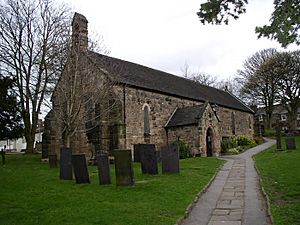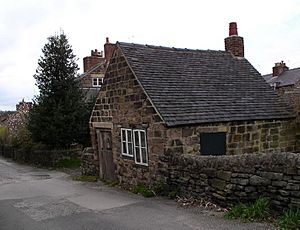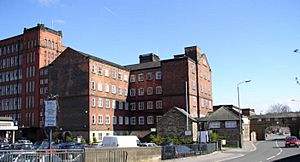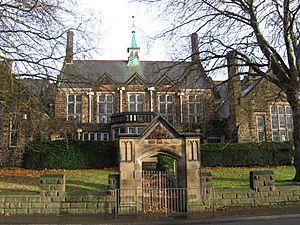Belper facts for kids
Quick facts for kids Belper |
|
|---|---|
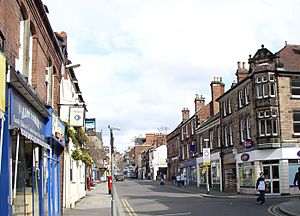 King Street |
|
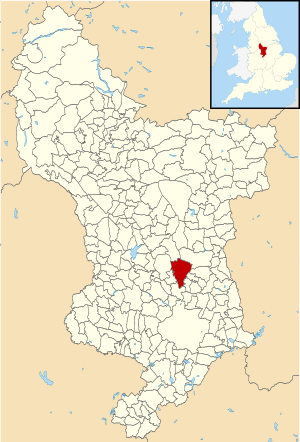 Belper parish highlighted within Derbyshire |
|
| Population | 21,822 (civil parish, 2011) |
| OS grid reference | SK351476 |
| Civil parish |
|
| District |
|
| Shire county | |
| Region | |
| Country | England |
| Sovereign state | United Kingdom |
| Post town | BELPER |
| Postcode district | DE56 |
| Dialling code | 01773 |
| Police | Derbyshire |
| Fire | Derbyshire |
| Ambulance | East Midlands |
| EU Parliament | East Midlands |
| UK Parliament |
|
Belper (/ˈbɛlpər/) is a town and civil parish in the local government district of Amber Valley in Derbyshire, England, located about 7 miles (11 km) north of Derby on the River Derwent. Along with Belper, the parish includes the village of Milford and the hamlets of Bargate, Blackbrook, and Makeney.
As of the 2011 Census, the parish had a population of 21,823. Originally a centre for the nail-making industry since the Middle Ages, Belper expanded during the early Industrial Revolution to become one of the first mill towns with the establishment of several textile mills; as such, it forms part of the Derwent Valley Mills World Heritage Site.
Contents
History
At the time of the Norman occupation, Belper was part of the land centred on Duffield held by the family of Henry de Ferrers. The Domesday Book of 1086 records a manor of "Bradley" which is thought to have stood in an area of town now known as the Coppice. At that time it was probably within the Forest of East Derbyshire which covered the whole of the county east of the Derwent. It was possibly appropriated by William de Ferrers, 4th Earl of Derby at some time after it was disafforested in 1225 and became part of Duffield Frith.
The town's name is thought to be a corruption of Beaurepaire – meaning beautiful retreat – the name given to a hunting lodge, the first record of which being in a charter of 1231. This would have been the property of Edmund Crouchback, 1st Earl of Lancaster who died in 1296, the record of his estate mentioning "a capital mansion". The chapel built at that time still exists. Originally consecrated in 1250 as the Chapel of St Thomas, it was rededicated to St John during the reign of King Henry VIII. St John's Chapel is still in use today and is thought to be the oldest building still standing in Belper though it is now used for council meetings rather than church services.
The coal deposits of Derbyshire are frequently associated with ironstone within the clay substrate. Initially obtained from surface workings, it would later have been mined in shallow bell pits. It is thought that this was important for the de Ferrers family, who were ironmasters in Normandy. By the reign of Henry VIII Belper had grown to a substantial size. It is recorded that in 1609 fifty-one people died of plague. However, in a Parliamentary Commissioners' report of 1650 regarding Duffield and its chapelries, Belper is described as "a hamlet appertaining to Duffield".
From at least the 13th century there were forges in the Belper and Duffield areas and iron-working became a major source of income, particularly nail making. By the end of the 18th century there were around 500 workshops in the town supplying nails to the newly built textile mills. The workshops were eventually superseded by machinery during the 19th century. Some of the nail-makers' houses are still in existence and form part of local tours of the town.
The industrialist Jedediah Strutt, a partner of Richard Arkwright, built a water-powered cotton mill in Belper in the late 18th century: the second in the world at the time. With the expansion of the textile industry Belper became one of the first mill towns. In 1784 Strutt built the North Mill and, across the road, the West Mill. In 1803 the North Mill was burnt down and replaced by a new structure designed to be fireproof. Further extensions followed, culminating in the East Mill in 1913 – a present-day Belper landmark. Although no longer used to manufacture textiles the mill still derives electricity from the river, using turbine-driven generators.
Strutt had previously patented his "Derby Rib" for stockings, and the plentiful supply of cotton encouraged the trade of framework knitting which had been carried on in the town and surrounding villages since the middle of the previous century. Mechanisation arrived about 1850, but by that time the fashion for stockings for men was disappearing. However elaborately patterned stockings, for ladies especially, were coming into vogue, and the output of the Belper "cheveners" was much in demand.
The construction of the North Midland Railway in 1840 brought further prosperity. Belper was the first place in the UK to get gas lighting, at a works erected by the Strutts at Milford. Demand was such that in 1850, the Belper Gas and Coke Company was formed, with a works in the present Goods Road. Electricity followed in 1922 from the Derby and Nottingham Electrical Power Company's works at Spondon. The first telephones came in 1895 from the National Telephone Company. The end of the century also brought the motor car, CH218, owned by Mr. James Bakewell of The Elms being possibly the first.
Belper remained a textile and hosiery centre into the 20th century. Meanwhile, other companies were developing: iron founding led to Park Foundry becoming a leader in the solid-fuel central-heating market; Adshead and Ratcliffe had developed Arbolite putty for iron-framed windows; Dalton and Company, which had been producing lubricating oils, developed ways of recovering used engine oil proving useful during the Second World War. In 1938, A. B. Williamson had developed a substance for conditioning silk stockings; the introduction of nylon stockings after the Second World War seemed to make it redundant, but mechanics and fitters had discovered its usefulness in cleaning hands and it is still marketed by Deb Group as Swarfega.
Geography
Belper is 8 miles (13 km) north of Derby and is in the valley of the River Derwent. The town had a population of 20,548 living in 8,790 households according to the 2001 census.
As well as Belper itself, the civil parish also includes the communities and hamlets of:
-
- Bargate
- Belper Lane End
- Blackbrook
- Broadholm
- Far Laund
- Farnah Green
- Makeney
- Milford
- Mount Pleasant
- Openwoodgate
- White Moor
- Wyver
Blackbrook
The hamlet of Blackbrook is located 2 miles (3 km) west of Belper on the A517 Ashbourne road.
Openwoodgate
The adjoining community of Openwoodgate lies to the east, 1 mile from the centre of Belper. A small eastern portion, centred around Openwood Road and the Kilburn Lane section of the A609 road, containing the historic Ireton Houses cottages, and bordered by the A38, is contained within Denby parish.
Wyver
This is a rural district lying west of the River Derwent and just north of Belper and Mount Pleasant. It contains a nature reserve on a nineteen-acre site. The nearby lane is part of the Derwent Valley Heritage Way. The reserve is placed on a reoccurring flood plain which makes it an attractive place for wildlife, especially wading birds.
Hills
Hillside is to the west of Belper Lane End, and contains the highest point of the parish at 214 metres (702 ft).
Firestone Hill is to the west of the town by the parish boundary at 191 metres (627 ft). Several masts for communications are positioned there.
Another local feature is Bessalone Hill at 182 metres (597 ft) to the north. It also maintains radio masts.
Pinchom's Hill is north of Bargate, by Sandbed Lane. It is 169 metres (554 ft) in height.
Economy
Belper's economy was traditionally reliant on manufacturing industry and numerous goods were made in the town. Cotton spinning and textile production were major employers virtually for much of the 19th and early 20th centuries. The large East Mill and the smaller North Mill are now all that remain of the industry and are preserved as part of the Derwent Valley Mills world heritage site.
During the Second World War, Rolls-Royce based the Merlin aero engine design team and Robotham's engine design division developing the Meteor tank engine at Belper. After the Second World War, J. W. Thornton, the chocolate maker, moved into the town from Sheffield, which helped to alleviate the employment problems arising from the contraction of the earlier industries. In 1985, the company relocated to a new site a few miles away in Swanwick.
Today, the main employment sectors are retail and services although some manufacturing industry remains. The main shopping area is centred on King Street and Bridge Street. The town has three supermarkets, the Co-operative, Morrisons and Aldi. There are two discount shops, Poundland and B&M Bargains. There are smaller Tesco and Co-op supermarkets on the Whitemoor estate.
Transport
Road
The A6 is the major through-road of the town and runs parallel to the River Derwent to the west.
Rail
Belper railway station is situated on the Midland Main Line. Regular trains between Derby and Matlock on the Derwent Valley Line are almost the only services to stop there, although one main line service to and from Sheffield stops on weekdays at times designed to assist Belper residents working in Sheffield. The group 'Friends of the Derwent Valley Line' are campaigning for more such services.
Buses
The town is served by regular bus services to Derby and surrounding towns and villages as well as longer routes to Manchester and London. The major operator is Trent Barton who operate the bus garage on Bridge Street.
Religion
The oldest church still used for its original purpose is the Belper Unitarian Church, built in 1788. The present Methodist church was opened on 28 June 1807 and was originally built to hold 1,400 worshippers.
St Peter's Church, a prominent landmark in the town, was built in 1824 to replace the smaller 13th century St John's Chapel which is now used as a town council and heritage chamber. A second Anglican church, Christ Church, was built in 1850. A local saying calls St Peter's "the low church in the high place" and Christ Church "the high church in the low place" based on their different liturgical traditions. Belper's churches are intertwined in a group known as "Churches Together" in which they work together on events etc. Belper's Parish led by Rev. Ann Stratton consists of St. Peters' Church, St. Swithun's Church, and St Mark's Church.
The town is also home to Belper Baptist Church, a spiritualist, a Roman Catholic, Belper Congregational Church and a further Methodist church at Openwoodgate, as well as Belper Community Church which meets at Whitemoor Day Centre three times a month.
Public services
Babington Hospital provides health services to the local people.
The town has a fire station, with one fire engine crewed by retained personnel.
Culture
Sport
Belper Town F.C. play their home games at Christchurch Meadow and are currently play in the Northern Premier League Division One East at Step 4 of the English non-league pyramid system. They are nicknamed the Nailers as a reference to the historical nail manufacturing industry in the town.
Belper Rugby Club play their home games at Strutt's Playing Field and are currently competing in RFU Midlands 3 East (North). The club was founded in 1975.
Belper United F.C. is a football club based in Belper, Derbyshire, England. They are currently members of the United Counties League Division One and play at Coronation Park the home of Eastwood Town F.C. in Nottinghamshire.
Belper Meadows Cricket Club was founded in 1880 and still plays on Christchurch Meadows, formerly the private ground of Mr G H Strutt, which it took as its home when the ground on Derwent Street on which the Belper Cricket Club founded in 1857 had played became unavailable. The club was a founder member (1970) and three times champion of the Central Derbyshire Cricket League before that league merged with the Derbyshire County Cricket League in 1991.
Poetry Trail
In 2009, members from two of the town's poetry groups completed a poetry trail in memory of local poet Beth Fender, who died in 2002. Beth's Poetry Trail consists of 20 poems situated in a variety of locations in the town, such as outside Belper Library. Poems by Emily Dickinson, Philip Larkin and Spike Milligan are included on the trail, as well as Beth's own poetry.
Awards
In 2014, Belper was presented with the High Street of the Year award for the Market Town category, as well as winning the award overall. The judges stated "Belper is blessed with a wonderful history as a World Heritage Site but has much to offer as a thriving market town as well." The judges felt that this outstanding application demonstrates how much more can be done to transform an outwardly successful town centre into a go-to destination for locals and visitors alike." Belper won against towns and high streets such as Brighton, Colwyn Bay and many other places. Belper won a further award in the Champion High Street category in 2019.
Music
Belper Singers are an experienced chamber choir of some 25 voices, who sing both sacred and secular works. They give about five performances a year, including singing in various cathedrals.
Belper is also home to a weekly folk club welcoming singers, instrumentalists, poets, readers and audience members. Two traditional dance teams make their home in the town: Heage Windmillers (rapper) and Makeney Morris (Cotswold morris).
Andy Sneap (born in Belper) is a Grammy-winning music producer, songwriter and guitarist with British heavy metal band Hell. He is one of the most active and successful music producers in the metal music genre, with over 100 albums produced at his Backstage Recording studios in the rural outskirts of the town.
The Belper Moo
The Belper Moo began in March 2020, in response to the nationwide lockdown prompted by the COVID-19 crisis. Started by Belper resident Jasper Ward, it was advertised on social media as a means of 'fighting lockdown stress, boredom and loneliness'. At 6.30pm, every evening, Belper residents were encouraged to mimic a cow's moo from their windows, doorways and gardens while following social distancing guidelines. The idea quickly caught the imagination of the people and Belper and spread rapidly around the town. Many residents fashioned their own devices for amplifying their moos, which became known as 'Moocraphones', 'Didgerimoos', Megamoophones' and 'Saxamoophones'. Following coverage on BBC radio and on BBC Online, 'The Moo' attracted media attention worldwide. Residents uploaded their 'moos' to the internet and a number of creative responses followed including songs, craft projects and poems. By early May, The Belper Moo had been participated in by thousands of residents for over 50 days. The Moo was resurrected during the November 2020 lockdown.
Pride in Belper
Belper has an annual Pride event, supporting the LGBT community, usually the first Saturday in August. This started in 2019 and has grown into a large community event with a parade, music and arts activities.
Belper Arts Trail
The annual Belper Arts Trail is an artist led initiative which aims for artists to exhibit and promote their work. It began in 2014 when two artists wanted to help strengthen the local artistic community and to find interesting and creative solutions to the lack of dedicated space in Belper for artists to exhibit. Utilising every possible space as a venue over the Arts Trail weekend art can now be found in a variety of unusual spaces. With Belper and Derbyshire overflowing with artistic talent it was felt that Belper really needed an interactive trail of creativity which has now grown each year to become a key Derbyshire event. The trail takes place annually over the May Day Bank Holiday.
Festivals
Belper has become well-known for its festivals with festivals such as "Belper Goes Green" (a musical event that aims to raise awareness of environmental problems and aims to share ways of reducing our impact on the planet), "Belper Games" (a festival where people compete in several challenges), "Belper Food Festival" (where stalls showcasing local business' food and dishes are put up around the town), and "Belper Music Festival" (where businesses have music on inside or outside their premises showing off local musicians and bands.) These events have become an annual occasion which help to boost the local economy throughout the town and support local small businesses.
Media
Local news and television programmes are provided by BBC East Midlands and ITV Central. Television signals are received from the local relay TV transmitter.
Local radio stations are BBC Radio Derby on 104.5 FM, Smooth East Midlands on 101.4 FM, Capital East Midlands on 102.8 FM, Greatest Hits Radio Midlands on 106 FM and Amber Sound FM, a community station that broadcasts on 107.2 FM in the Amber Valley and online.
Local newspapers are the Belper News and Derbyshire Times.
Education
Primary schools
There are eight primary schools which feed the single secondary school:
- Holbrook Primary School;
- St Elizabeth's Catholic Voluntary Academy;
- St John's Church of England Primary School;
- Herbert Strutt Primary School;
- Pottery Primary School;
- Long Row Primary School;
- Ambergate Primary School;
- Milford Primary School.
Secondary schools
Belper School and Sixth Form Centre has approximately 1,400 pupils aged 11–18. It was originally named "Belper High School" when it was built in 1973, and is adjacent to Belper Leisure Centre. Famous people to have attended the school include Ross Davenport – winner of two swimming gold medals at the 2006 Commonwealth Games – and Alison Hargreaves, holder of a number of mountaineering records.
Herbert Strutt Grammar School was among the Strutt family's bequests to the town. It became a middle school in 1973, with the opening of the new Belper High School, and latterly a primary school, in use as such until spring 2008 when it was replaced by a new building on a different site. Notable among its pupils were the actors Alan Bates and Timothy Dalton.
For a number of years from 1979, the innovative Rowen House School provided education on democratic principles. Also, during the 1970s and 1980s, Belper was the site of an experimental three-tier education system, comprising a number of primary schools (age 5–9 years, referred to as "first" schools), feeding into two main secondary schools (age 9–13 years, referred to as "middle schools"), pupils from both then usually attended a single American-style high school (age 13–18 years). In the mid-1980s, this scheme was abandoned, and the current two-tier system adopted. At the same time, one of the two secondary schools, Parks Secondary School, was closed down and the buildings, which were in a poor state of repair, demolished. In recent years, the site of the former Parks Secondary School has been used for a new school.
International links
Belper is twinned with Pawtucket, Rhode Island after Samuel Slater – an apprentice of Jedediah Strutt – went there and founded the American cotton spinning industry.
Belper made international news in 2001 after rejecting a gift of a large fibreglass Mr. Potato Head model from Pawtucket, as some residents considered it "hideous". The statue was refurbished and returned in 2015, though opinion is still divided.
Notable residents
- Tom Ballard, rock climber and alpinist, who was the first mountaineer to climb the six major alpine north faces solo in a single winter season.
- Alan Bates, actor, attended Strutt's School
- Samuel Booth, father of The Salvation Army founder William Booth, was born here in 1775
- Maxwell Caulfield, stage, film and television actor
- Barry Coope (1954–2021), folk musician, was born here
- Timothy Dalton, actor, the fourth James Bond, was brought up here
- Ross Davenport, Commonwealth games double gold medalist swimmer
- Monica Edwards, children's writer, was born here in 1912
- Alison Hargreaves, mountain climber, known for scaling Mount Everest unaided and soloing all the great north faces of the Alps in a single season, grew up in Belper and attended Belper High School
- Will Hay, comedian and actor, lived in Belper while performing locally in the 1920s
- Andrew Jarrett, tournament referee at Wimbledon for 14 years from 2006
- Suzy Kendall, first wife of Dudley Moore, actress in British and Italian films
- John Lawton, novelist, author of Black Out and Blue Rondo, was born here
- Penelope Mortimer, novelist, author of The Pumpkin Eater, was the daughter of the vicar of St Peter's church
- Tracy Shaw, actress, played Maxine Peacock (1995–2003) in Coronation Street
- Samuel Slater, "father of the "American Industrial Revolution", grew up on Chevin Road and apprenticed at Milford
- Admiral Sir Trevor Alan Soar, former Commander in Chief Fleet of the Royal Navy, was born in Belper.
- Bombardier Charles Stone who was awarded the VC was born, and is buried, here
- Jedediah Strutt, inventor and industrialist, opened his first mill in Belper (1777)
- Frank Swettenham, colonial ruler of Malaya, author, was born in Belper in 1850.
- Nigel Vardy, mountaineer, grew up in Belper and attended Long Row Primary School, Herbert Strutt Middle School and Belper High School
- Ron Webster, professional footballer, born in Belper in 1943. A full back, Webster played 455 league games for Derby County between 1960 and 1978.
See also
 In Spanish: Belper para niños
In Spanish: Belper para niños


